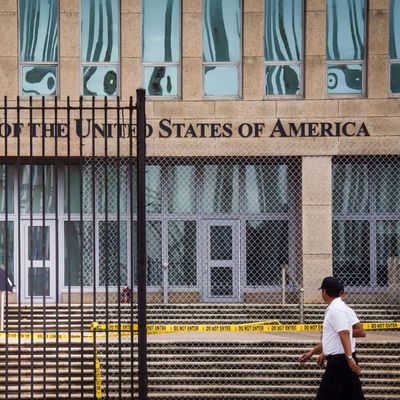
For several years, national-security experts, scientists, and commentators have been locked in an ongoing debate about the nature and causes of Havana syndrome, the mysterious ailment that began affecting diplomats and spies stationed abroad in the mid-2010s, who experienced debilitating headaches, vertigo, and impacted vision and hearing. Were the painful symptoms the result of a directed-energy beam designed to impair U.S. officials? Were they side effects of some sort of device aiming their computers? With multiple studies unable to pinpoint specific physical damage suffered by victims and an intelligence report casting doubt that a foreign adversary was involved, some suggested that the real culprit was a mass psychogenic illness. Regardless of the cause, Congress passed a law in October 2021 guaranteeing medical care for the 1,500 or so bureaucrats and spooks who have reported experiencing Havana syndrome’s puzzling suite of symptoms.
The conversation around Havana syndrome had quieted down a bit. But a 60 Minutes report brought it back to life. The show collaborated with a Bulgarian journalist named Christo Grozev, who, in 2018, broke the story of a secret Russian intelligence group called Unit 29155, which has been linked to assassination attempts and clandestine attacks. Grozev sourced a 2014 email from an assistant to a deputy commander of the unit claiming that they were researching “potential capabilities of non-lethal acoustic weapons in combat activities in urban settings.” He told 60 Minutes that he believes this is evidence that “this particular unit had been engaged with — somewhere, somehow — empirical tests of a directed energy unit.” Grozev, who collaborated on the research with the German newspaper Der Spiegel, also traced the location of Unit 29155 members to locations where Americans were reporting Havana syndrome symptoms just before the events occurred. In the 60 Minutes segment, the retired Army lieutenant colonel who led the Pentagon investigation into the mysterious ailment also claimed he was confident that Russia was behind the phenomenon. “Consistently there was a Russia nexus,” he said.
CBS also aired the account of an unnamed FBI agent who claimed that she was experiencing intense pain and disorientation while at home in Florida in 2021. At the time, CBS reports that she was investigating a Russian national with a top security clearance named Vitalii Kovalev, who was arrested for evading police during a high-speed chase in which police officers found a suspicious device that would wipe his car’s GPS history. After Kavolev’s arrest, the FBI agent claims that she began experiencing symptoms. Kovalev has since died in the war in Ukraine.
U.S. intelligence officials have cast doubt that an adversary is targeting Americans with some sort of microwave or directed-energy weapon. In March 2023, an intelligence community assessment from seven agencies determined that it is “very unlikely” that Russia or another country is behind the attacks. Instead, the report claimed it was “probably the result of factors that did not involve a foreign adversary, such as pre-existing conditions, conventional illnesses, and environmental factors.” That assessment was backed up by a report from the National Institutes of Health released last month in which researchers did not find evidence of brain injury in people reporting Havana syndrome symptoms.
Experts who spoke with the Wall Street Journal were also doubtful that microwave weapons are ready for deployment. While microwave weapons exist, University of Pennsylvania bioengineering emeritus professor Kenneth Foster said that they would need to be moved around in a shipping container — not exactly the subtle spycraft detailed in victim accounts so far. Field-leading biophysicist Allan Frey also noted that the energy from microwave weapons would be detectable. He claims that the CIA told him that in several cases of Havana symptoms, no energy was detected.
“I and my leadership team stand firmly behind the work conducted and the findings,” CIA director William Burns said in 2023. “I want to be absolutely clear: These findings do not call into question the experiences and real health issues that U.S. government personnel and their family members — including CIA’s own officers — have reported while serving our country.”
At least Russian intelligence and the CIA can agree on one thing for now. On Monday, Kremlin spokeperson Dmitry Peskov denied the allegations in the 60 Minutes report, claiming that “this is nothing more than a baseless accusation.”






























